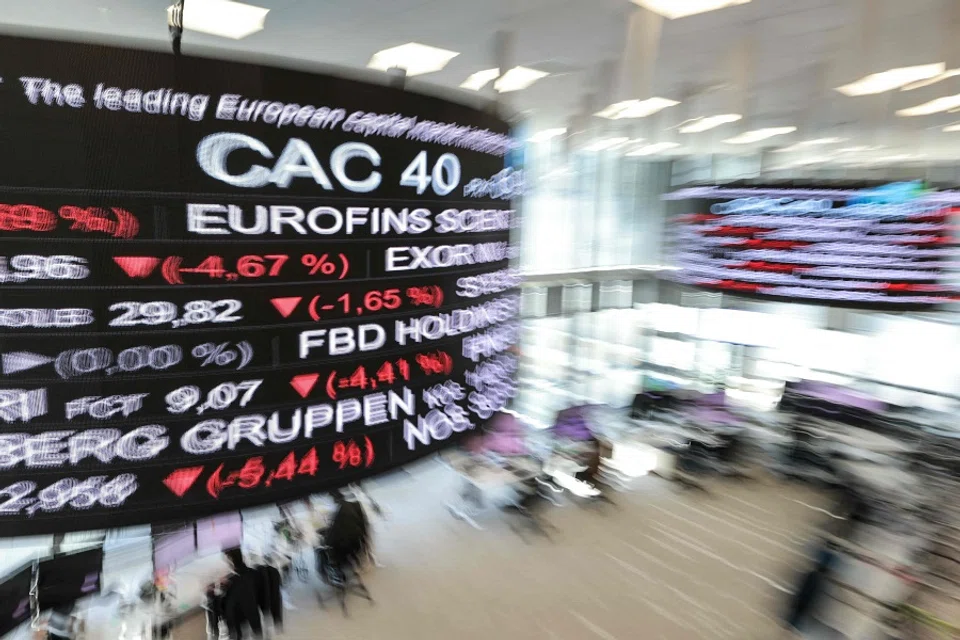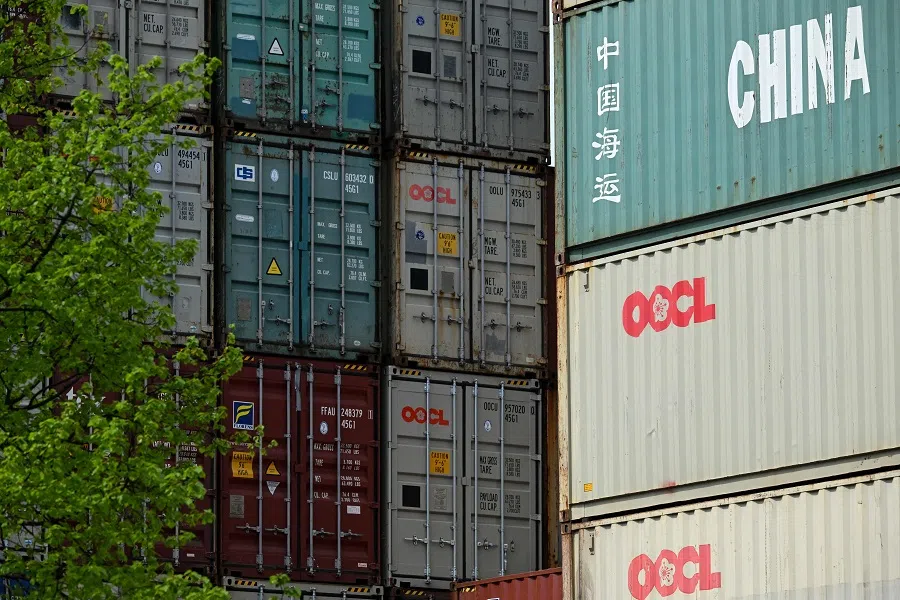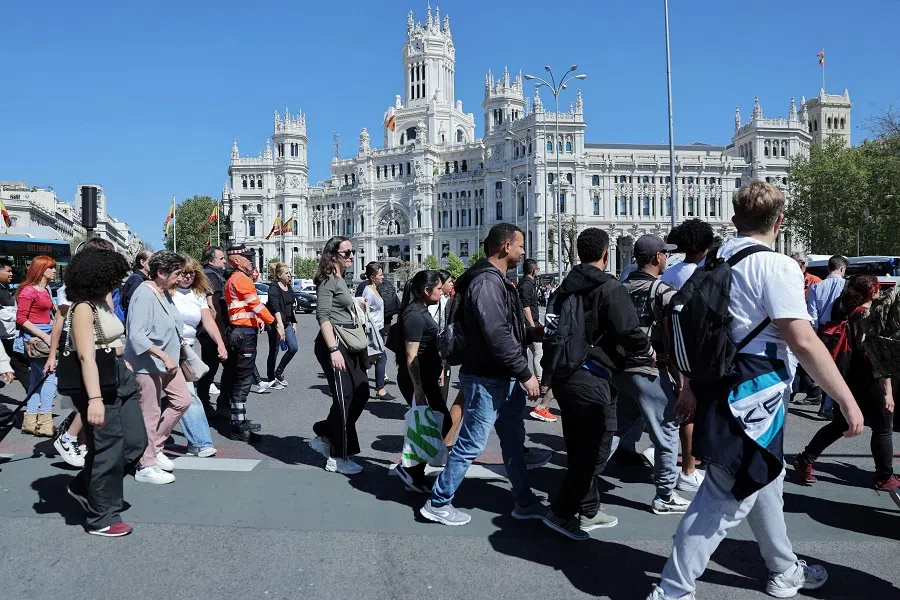Why isn’t China courting Europe amid the tariff war?
The EU wants more from its relationship with China, pushing for a rebalanced partnership. But despite the disruption caused by Trump’s trade war and escalating US tariffs, China seems uninterested in deepening ties with the EU, its second-largest export market. Why is there no offer coming from Beijing to seduce the Europeans? French researcher Mathieu Duchâtel shares his analysis.

Three months into the Trump administration’s second term, one question stands out in the evolving dynamics of the China-EU-US triangle: why has China not made a significant trade or market access offer to the EU?
A cautious approach
With US tariffs on Chinese goods surging to 145% by April 2025 and Europe visibly disoriented by Washington’s hostility — some even suggesting that dismantling the EU may be the administration’s hidden agenda — it would have been logical for Beijing to seize the moment and court Brussels. The EU is, after all, China’s second-largest export market after ASEAN, and this year marks the 50th anniversary of the establishment of diplomatic ties between the two sides.
Yet Beijing’s tone has remained strikingly cautious. In March 2025, Wang Yi spoke of the need to “renew the purpose” of EU-China relations, calling for enhanced communication and mutual trust, but also aiming low, at “maintaining this partnership relationship”. He also expressed confidence that the two sides have “the capacity and wisdom to properly resolve pending issues through friendly consultation”.
During a meeting with Spanish Prime Minister Pedro Sánchez in Beijing, Xi Jinping asserted that “China and the EU should step up to their international responsibilities, jointly safeguard economic globalisation and the international trade environment, and jointly reject unilateral and bullying actions”, warning that there are “no winners in tariff wars”.
Today, after a decade of Xi Jinping personally presiding over EU-China summits, Beijing appears to be reverting to an earlier model — delegating the lead on EU relations back to the premier of the State Council.
China not incentivised to court the EU
These remarks projected an image of stability, not strategic realignment. They betray a vision of EU-China relations focused on preserving the status quo rather than pursuing deeper cooperation. This is understandable, given that the current situation works overwhelmingly in China’s favour.
In 2024, China exported €517.8 billion (US$588.14 billion) of goods to the EU, generating a trade deficit for the EU of €304.5 billion. Continuous access to the single market has always been unambiguously the top strategic priority of the Chinese leadership vis-à-vis Europe.
During the Hu Jintao-Wen Jiabao era, when the Chinese premier oversaw relations with the EU, he would respond to European complaints that the so-called “comprehensive strategic partnership” existed only on paper — with little to show in terms of real strategic cooperation — by asserting that bilateral trade alone was strategic enough for China.

Today, after a decade of Xi Jinping personally presiding over EU-China summits, Beijing appears to be reverting to an earlier model — delegating the lead on EU relations back to the premier of the State Council. If this is confirmed when the next EU-China summit takes place this summer, this shift will be telling. It signals a deliberate move to refocus the relationship on trade and economic issues, while sidestepping more contentious geopolitical matters. Chief among them is the war in Ukraine.
Beijing’s second priority in its relationship with the EU has been to prevent any serious escalation over its critical support for Russia’s invasion of Ukraine. While this support has already undermined much of the strategic trust that once existed between European leaders and their Chinese counterparts, the resulting distrust has come at little real cost. A few Chinese entities have been targeted by EU sanctions, but the measures have had such a limited impact that Beijing has scarcely responded. From China’s perspective, preserving this impunity has been a major strategic success.
... the intention is evident: offer minimal, symbolic concessions to keep relations from sliding further.
China wants status quo, EU wants more
To be sure, the status quo of unthreatened access to the EU’s single market and of Sino-Russian strategic cooperation undermining EU-China relations has never been so close to being disrupted.
That said, this status quo is fragile. There are signs that China is considering limited gestures to prevent a further deterioration in relations. One such move under discussion is the lifting of countersanctions imposed on members of the European parliament in 2021, a retaliatory response to EU sanctions over human rights abuses in Xinjiang. Whether other targets, like the Mercator Institute for China Studies and certain European academics, will be removed from China’s sanctions list remains unclear. But the intention is evident: offer minimal, symbolic concessions to keep relations from sliding further.

Another signal lies in the ongoing negotiations with EU Commissioner for Trade and Economic Security Maroš Šefčovič over the future of Chinese electric vehicle (EV) exports to Europe. In 2024, the EU introduced anti-subsidy tariffs on Chinese EVs in response to significant distortions caused by Beijing’s heavy subsidization of the sector. The talks aim to defuse this tension, possibly through price undertakings and more EV investment by Chinese companies in Europe.
... described by French historian François Godement as a “reverse Deng Xiaoping”, Europe is increasingly open to absorbing technology, industrial processes and high-quality jobs through joint ventures...
In an evolution that has been described by French historian François Godement as a “reverse Deng Xiaoping”, Europe is increasingly open to absorbing technology, industrial processes and high-quality jobs through joint ventures — an idea rumoured to be on the table in the EV discussions between the European Commission and China’s Ministry of Commerce.
Yet a fundamental asymmetry defines the current dynamic. While China’s main objective is to preserve the status quo, the EU is pursuing a more ambitious agenda. Commissioner Šefčovič has made clear that Brussels seeks a rebalanced relationship — one that tackles structural issues like industrial overcapacity, subsidies and the persistent barriers European firms face in the Chinese market. So far, however, there are no indications that Beijing is prepared to relax its rigid stance on these core economic policies.
Diverging objectives
This divergence in objectives underscores why attempts to utilise EU-China relations in response to Trump’s tariffs are unlikely to produce significant leverage for the EU. A narrow deal on EVs might send a momentary signal to Washington, but it would quickly be drowned out by the broader turbulence of global geoeconomics.
As long as China’s access to the European single market remains fundamentally secure, Beijing is unlikely to go beyond the low-cost gestures it appears willing to make in 2025 — such as lifting some of its countersanctions, or reaching an agreement on EV exports, which it anyway prefers to anti-subsidy tariffs.
For the EU, a more viable path lies not in geopolitical triangulation but in strengthening its own industrial base, accelerating innovation, reinforcing economic security and diversifying trade and technology partnerships — especially in Asia.





![[Big read] When the Arctic opens, what happens to Singapore?](https://cassette.sphdigital.com.sg/image/thinkchina/da65edebca34645c711c55e83e9877109b3c53847ebb1305573974651df1d13a)